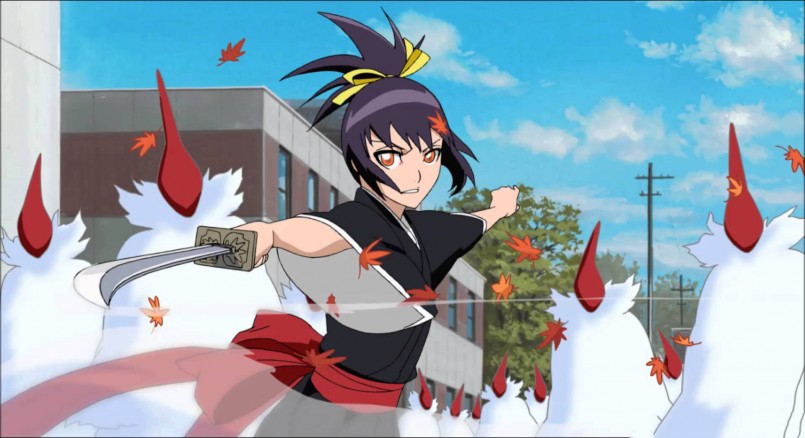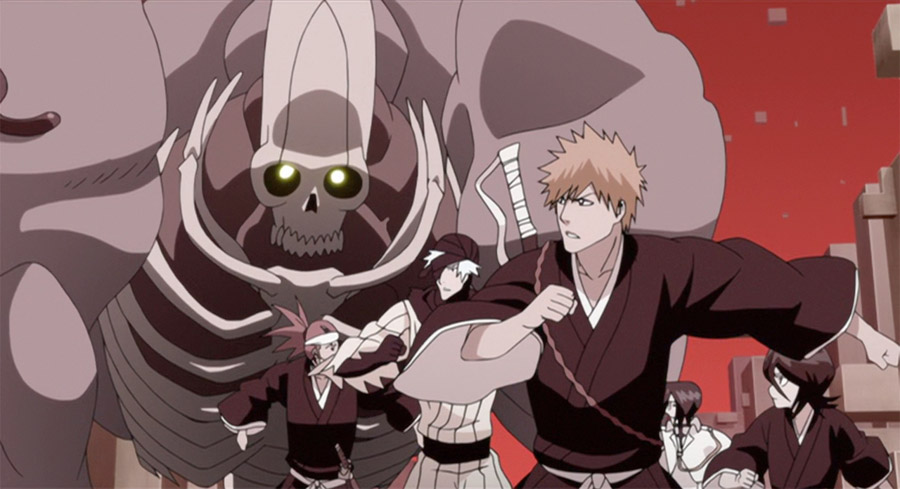Bleach
 The first volume of the Bleach manga, created by Tite Kubo, debuted in August of 2001 in the weekly Shōnen Jump magazine. Three years later, Bleach took to the TV screens of Japan with its first episode airing on Oct. 5, 2004. Even though Bleach is one of Shonen Jump’s most popular manga and anime series, the anime came to an end abruptly in March 2012. Bleach follows the story of a teenager named Kurosaki Ichigo and how is unexpectedly thrust into a complex spiritual world parallel to our own where squads of shinigami (also called Soul Reapers) battle demons called Hollows and free the souls of the departed to pass on to a place called Soul Society. Bleach is often quite bloody and dark, so it’s not generally great for families, but has a huge cast of very complicated and well-developed characters that are sure to enthrall more mature anime viewers.
The first volume of the Bleach manga, created by Tite Kubo, debuted in August of 2001 in the weekly Shōnen Jump magazine. Three years later, Bleach took to the TV screens of Japan with its first episode airing on Oct. 5, 2004. Even though Bleach is one of Shonen Jump’s most popular manga and anime series, the anime came to an end abruptly in March 2012. Bleach follows the story of a teenager named Kurosaki Ichigo and how is unexpectedly thrust into a complex spiritual world parallel to our own where squads of shinigami (also called Soul Reapers) battle demons called Hollows and free the souls of the departed to pass on to a place called Soul Society. Bleach is often quite bloody and dark, so it’s not generally great for families, but has a huge cast of very complicated and well-developed characters that are sure to enthrall more mature anime viewers.
Bleach: Memories of Nobody (2006)
Director: Noriyuki Abe
Last Episode Before Release: Episode 107
The first Bleach movie is a stand-out film for many reasons: the movie’s primary original character, a mysterious female shinigami named Senna, is thoroughly endearing and easily stands among the best Bleach characters, the story is both meaningful and touching, and it’s both visually and aurally well-produced. The movie’s story centers around Senna’s mysterious appearance along with strange Hollow-like creatures called Blanks and how Ichigo attempts to protect her from a group of shinigami called the Dark Ones. Even though it’s a non-canonical anime movie, so you know from the get-go that nothing too serious can happen, the movie still carries an uncharacteristically deep emotional weight and is a must-see for anime and Bleach fans alike.
Bleach: The DiamondDust Rebellion (2007)
Gekijōban Burīchi Za Daiyamondo Dasuto Reberion Mō Hitotsu no Hyōrinmaru
(劇場版BLEACH The DiamondDust Rebellion もう一つの氷輪丸)
(lit. Bleach: The DiamondDust Rebellion, Another Hyōrinmaru)
Director: Noriyuki Abe
Last Episode Before Release: Episode 153 (but best viewed after Episode 167)
Like One Piece’s The Cursed Holy Sword, The DiamondDust Rebellion features a popular character, in this case Tōshirō Hitsugaya (the captain of the Tenth Division), suddenly going rogue when a very powerful artifact called the King’s Seal is stolen under his watch. To avoid spoilers, I won’t discuss the plot any further other than to say that it involves some interesting details of Hitsugaya’s past. As in Memories of Nobody, a few interesting elements are added to the Bleach mythos through this movie, and while it’s not quite as emotionally heavy-handed as its predecessor, The DiamondDust Rebellion is a great anime movie, particularly for fans of Hitsugaya.
Bleach: Fade to Black (2008)
Burīchi Fade to Black Kimi no Na o Yobu (BLEACH Fade to Black 君の名を呼ぶ)
(lit. Bleach: Fade to Black, I Call Your Name)
Director: Noriyuki Abe
Last Episode Before Release: Episode 198
Another great Bleach movie. In Fade to Black, two mysterious people with an odd scythe erase everyone in Soul Society’s memories of Rukia’s existence, and by extension their memories of Ichigo. Ichigo and Kon soon snap back to normal and set out to try to figure out why Rukia was spirited away. Fade to Black is filled with fanservice, insofar as you get to see Ichigo once again battle many of the captains and vice-captains of the Gotei 13, and is generally all the more awesome for it. You get to learn even more about Rukia’s past and have a nice showy narrative to enjoy in the mean time. An enjoyable ride throughout, just make sure you know a thing or two about Bleach before watching it, otherwise the plethora of characters flashing by will be pretty overwhelming.
Bleach: Hell Verse (2010)
Burīchi Jigoku-Hen (劇場版BLEACH 地獄篇) (lit. Bleach: Inferno or Bleach: Hell Chapter)
Director: Noriyuki Abe
Last Episode Before Release: Episode 299
The most recent (and possibly final) Bleach movie is also possibly the best of a very good bunch. A group of strange warriors seemingly break out of hell itself to force Ichigo into helping them escape their eternal torment by bringing his sisters Karin and Yuzu down with them, raising the steaks quite high and definitely making the battle more personal for Ichigo than in the previous films. Tite Kubo was more personally involved with the production of this movie than its predecessors, and it really shows. Kubo’s unique humour and charm permeates the narrative throughout and makes this feel much more rooted in the spirit of the manga series than the movies and filler episodes generally do. With far and away the best audio and visuals yet attained in any single Bleach anime, a high-stakes story, and further expansion of the Bleach mythos regarding hell, this movie is not to be missed by any Bleach fan. To avoid spoilers, though, make sure you at the very least make it up to around episode 273 (preferably 299, the last episode before the movie was released, just to be safe) before watching Hell Verse.




